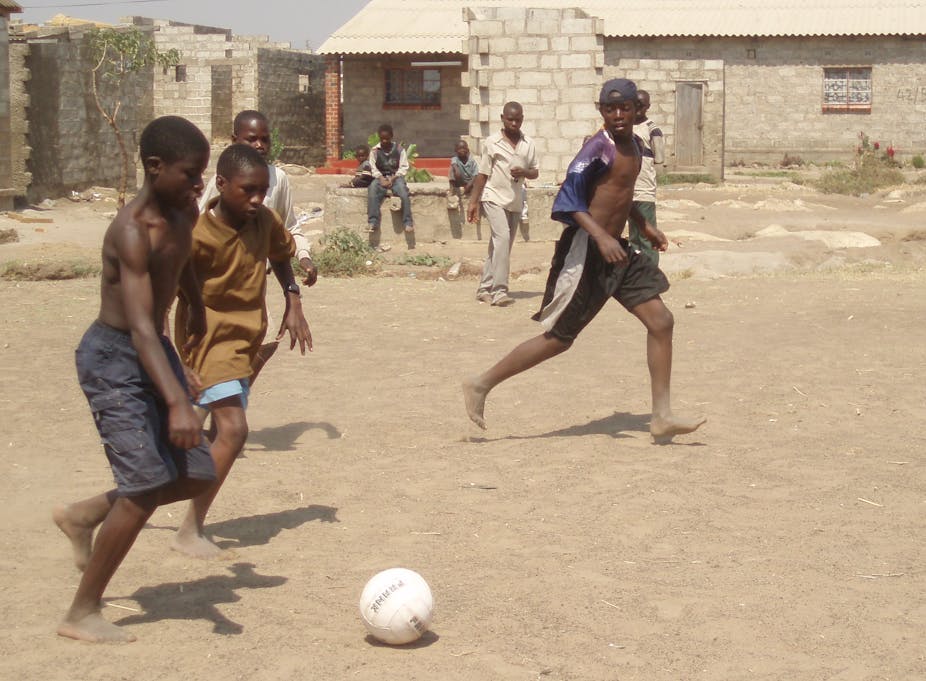-Sport has the potential to change lives. High profile examples of individual sportsmen and women often receive significant publicity, like the ten refugee athletes who competed at the Rio Olympics in 2016, or the charitable work done by football stars who use their fame to support their communities. The media loves such stories.
But sport is also changing lives through community projects all over the world, far more quietly and below the media radar. That’s why April 6 each year is marked as the International Day of Sport for Development and Peace. Organised by the United Nations, it celebrates projects that value “the positive influence that sport can have on the advancement of human rights, and social and economic development”.
Our recently published book, Localizing Global Sport for Development, focused on such projects in Zambia. We wanted to understand sport for development and peace as it’s organised and experienced in Zambia by local staff, volunteers and young people. The projects use sports such as netball, football and volleyball to get young people active, develop their leadership skills and provide them with support networks outside their homes and schools.
Sport has been recognised by the UN as an important enabler of sustainable development and a way to empower young people. So these organisations’ experiences – both their successes and their challenges – can offer valuable lessons to similar sport for development and peace initiatives elsewhere in the world.
Opportunities and experiences
In Zambia, as with sport for development and peace initiatives elsewhere, sport’s key contribution is to provide the context within which a range of development issues can be addressed. Adapted sporting activities and practices encourage active learning and peer-led discussions on key development issues such as HIV/AIDS. Specific female empowerment programmes are also organised to challenge traditional gender stereotypes through female participation in football, promote local female role models, and offer educational scholarships for female peer leaders.
Our research focused on the work of two non-governmental organisations: Sport in Action and EduSport. They work in communities across Zambia and especially in the capital city, Lusaka. Their activities engage boys and girls from primary school age right through to young adulthood.
We spoke to many young Zambians involved in the projects. Their enthusiasm for simply participating in sport stood out – there were few other positive recreational opportunities available in their communities. For some, getting involved in the projects gave a focus to otherwise unstructured lives and enabled a feeling of belonging. One young woman told us:
The friendship and being part of a team is very important. If it wasn’t for sport I wouldn’t have met so many girls, who I now consider are my extended family, and that has been very important. We share our differences and learn from one another.
The projects also gave young people a safe, more open space to learn about things like HIV/AIDS. They found the sporting context very different to their experiences in formal settings, such as in school and in church. The non-authoritative settings allowed them to speak more freely to adults – and to support each other in coping with situations that put them at risk of infection.
Many of the young women were participating in sport despite initial resistance from their families and communities. Although they became more confident, empowerment on the sports field didn’t necessarily transfer to their wider lives. As one young woman put it:
I play football and I feel strong and we are showing those in our community then we can do the things that men do….but men do not include us in community matters, we still have no say in what happens. It is changing a little but very slowly.
Both organisations had also selected and trained committed participants to take on positions of responsibility. They became peer leaders, acting as coaches, educators and organisers. They were volunteers and were motivated by helping to improve their communities.
The peer leaders developed skills, confidence and gained valuable experience. But they, like the young people they were mentoring, struggled to translate these benefits into their everyday lives. Youth unemployment rates are at 25% in Zambia, and the peer leaders’ skills didn’t help them to achieve their goal of finding regular, paid work.
Local matters
There’s one area in which the Zambian projects really stand out: they have adopted a locally-orientated ethos that strengthens community bonds amongst young people, while simultaneously trying to challenge regressive social norms.
Though social change may come slowly, a localised approach seems the right way to spark it. Young people recognise the social problems they face in their own communities, and through supportive projects can work together to attempt to address them. Other sport for development and peace organisations should be encouraged to adopt a similarly localised approach in their work.
In this way, sport really can keep changing lives – and contribute to nations’ sustainable development in the future.

